Primary tabs
Posts
not including Doodles
1997 March 22
Editor, the Bartlesville Examiner-Enterprise
P.O. Box 1278
Bartlesville, Oklahoma 74005
Editor:
The caller to Off the Cuff who likened a television broadcast to people fornicating in the middle of main street is the most profound, and pitiful, example of the hypnotic power of television. Or, more accurately, the weakness of some American minds. It was all the more poignant and pitiable that the caller was responding to a previous caller who had, wisely, noted that our televisions come equipped with a very important control called the "off" switch.
Our family has followed the uproar surrounding the broadcast of Schindler's List, and the comments of an Oklahoma representative, with considerable amusement. From the time our first-born was very young, television in our household has been tightly controlled. Their viewing habits were monitored and directed. Even Saturday morning cartoons were tape-recorded and they were early taught to use the fast-forward button to bypass the commercial announcements. This didn't prevent them from watching the ads they wanted to see, but they didn't have to sit through them repeatedly, and they soon learned that by fast-forwarding they could watch three half-hour shows in about one hour — learning to budget as well as control their own viewing.
When the kids were old enough to be granted more freedom, I noticed that their early training worked pretty well. The kids were able to distinguish between a quality program and junk. (So if they were watching junk, at least they knew it was junk.) When I'd catch them unawares, they'd be absorbing something from the Discovery channel. They've never yet seen any of the violent material most of their peers grew up on, and they never grew cynical about the better Disney productions.
Last year, for various reasons, we simply switched the tube off, and it's been mostly off ever since. The kids were forced to give up their cartoons, and Dad gave up his Star Trek and, with great regret, Babylon 5. We all miss Touched by an Angel. But, it's all on tape somewhere, I reminded them, it'll all be around for decades, in re-runs, and before long TV programs will be available like the computer files I get from CompuServe or the Internet — downloadable and watchable at our own time and convenience, not that of some advertising-motivated network program manager on the Coast. We cut the cable, quit the satellite subscription, and ignored the antenna. The VCRs, indeed, went into storage. We weren't even remotely threatened either by someone's idea of "entertainment" or by that most lurid and fictional of material called "the news."
The other night, I stopped at the video rental store, just to see if they knew when that movie Michael would be released. My daughter mentioned some other show we had thought to rent. We were all reminded that there are so many great movies, yes, and television shows, to watch. But we drove off empty-handed. I noted that we had been getting along pretty well, and had plenty to fill our lives, since we'd started doing without television, and to my surprise one of my wonderful offspring, indeed the one I felt had been most television-habituated, remarked, "That's for sure!" Gratifying!
So for that poor hapless victim of television addiction who called the paper, there is, for some of us at least, a monumental difference between what happens in the middle of main street and what we have the choice to view, or not view, broadcast into our homes. What you see on main street is unavoidable. What comes across the television you have to actually invite into your home, by purchasing the equipment, setting up the connections (antenna, cable, satellite dish), supplying the electricity, and turning it all on at certain times. A far more apt comparison than to main street would be whether you would permit a couple to come fornicate, or (more aptly) do violence to each other, in your living room while the kids were there. If you have your television on, it's your own choice. You have no one to blame but yourself.
Yes, Virginia, there is an "off" switch. It is effective. There is also self-discipline and parental discipline. But none of them work if you don't exercise them.
Mass Media News — Cause for Despair, or...? On the evolution, status, and future of news reportage and the public interest.

1.
A
It's your decision
F G
It's all in your mind
A
To pick up your choice
F G
Or keep dragging behind.
A
The world is your apple,
F G
They're waiting for you.
A F
:| Make sure you don't bite off
A
more than you can chew. |:
2. Potential placement, That's just you today. The path may be chosen But you choose to go the way. You choose how to be, To endure what derision. :| It's all in your mind. It's all your decision. |:
3. If you think that you Aren't up to this plan, You do what you must But not what you can. Choose a course with the knowledge of what you can be, :| And leave all the rest to the piloting Three. |:
4. Most people aren't ready For working alone, So if you're one of those, Choose a group of your own. Help cooperation Supplant competition. :| We'll all get there the sooner the less repetition. |:
A meditation on that tricky little entity you're using so poorly right now.
·Order the mini-comic in print — 8pg b&w, $1.00US includes postage from MINDFUL, Box 1215, Bartlesville OK 74005-1215 USA.
·Hear that MIDI again. ~24sec, ~2K
Performed in Mindful Webworkshop #11, 2016 Oct 21.
This is the regular verion. Here is a BIG GRAPHICS version.

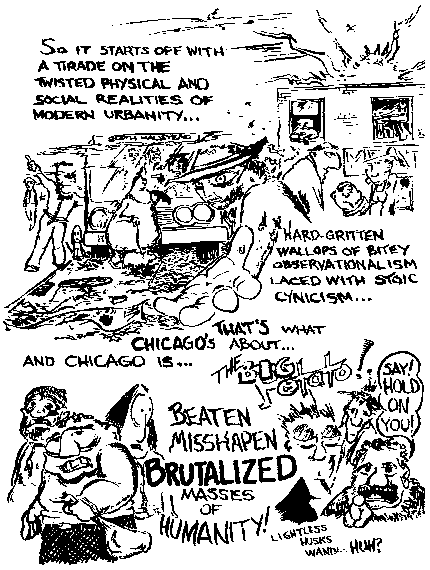
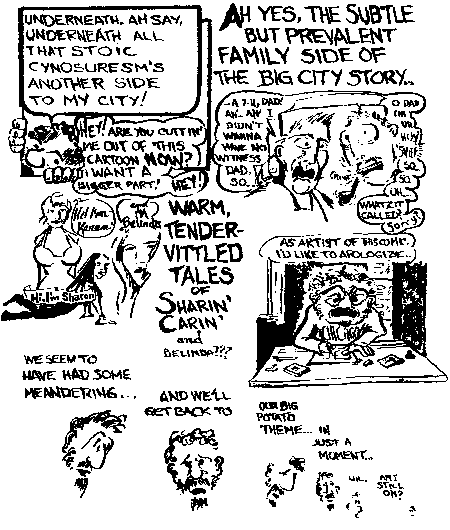
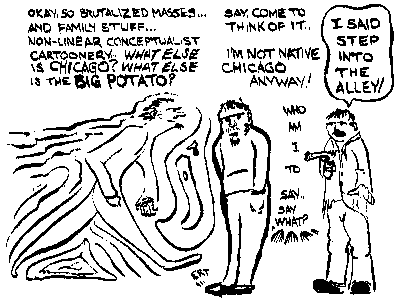
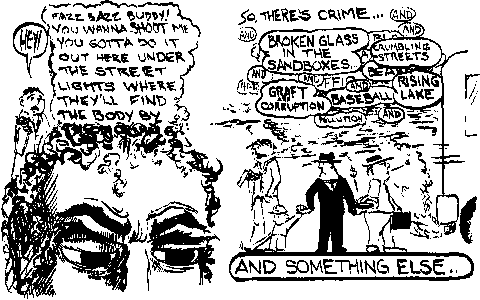
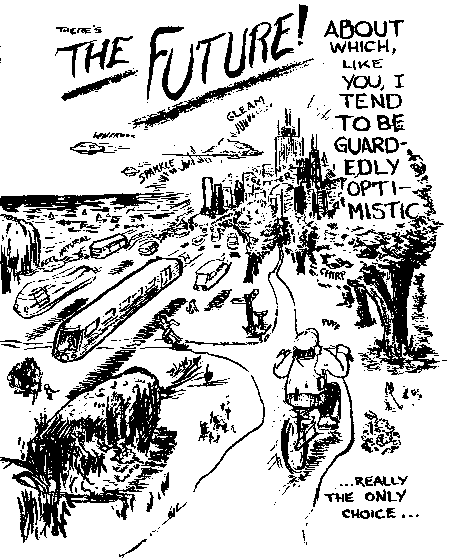



View the higher-resolution bigscreen version
Print Big Potato #1 as a mini-comic,
Big Potato #2
1.
Dm F
People die in the strangest places
Dm F
People die in the strangest ways
Dm F
People die in a hundred and fifty years
Eb Edim
Or a hundred and fifty days
2.
Dm F
People die when they least expect it
Dm F
People die like they planned all along
Dm F
People die for ideas they believe to be right
Eb Edim
People die because they were wrong
3.
Bb F
People die in the strangest places
Bb F
People die at the strangest times
Bb F
People die 'cause they're totally innocent
Eb Edim
People die 'cause of their crimes
4.
Eb F
People die when they're at their sharpest
Eb F
People die when they're in a haze
Eb F
People die in the strangest places
Eb F
People die in the strangest ways2012 Dec 25 - Project Blue Book Video
1997 Feb 27 - MIDI primitive arrangement ( 1m25s 4K)
For many years after World War II, the United States Air Force had a public task force investigating reports of extraterrestrial sightings and contacts. The task force report was called Project Blue Book. This is about a different blue book.
1. D C A Dm G I've got a blue "U" book. F G I wish you would take a look, F Em But only if you're int'rested Dm C In what it has to say Dm Concerning what you ask about. Em You can look with honest doubt, F But it will never help you out G If you explain it all away.
2.
Am
You can never realize
G
What you won't internalize.
F
No surprise will come from
Em
Anything you read
Dm
You can argue and debate
Em
And never have to correlate
F
Your life with what it has to state
G
On human need.
3.
Am
You can choose to worry, or
G
Choose not to worry anymore,
F
Listen to or just ignore
Em
Your better side.
Dm
No one else can make your choice.
Em
Only you can use your voice
F
For singing love or making noises
G
Out of pride.
4.
Am
Give the words a second glance.
G
Don't be afraid to take a chance.
F
You might find you like to dance
Em
Instead of sit.
Dm
But no one else can dance for you,
Em
Or love in quite the way you do.
F
And the blue "U" book
G
is for the benefit
F G C
of You

